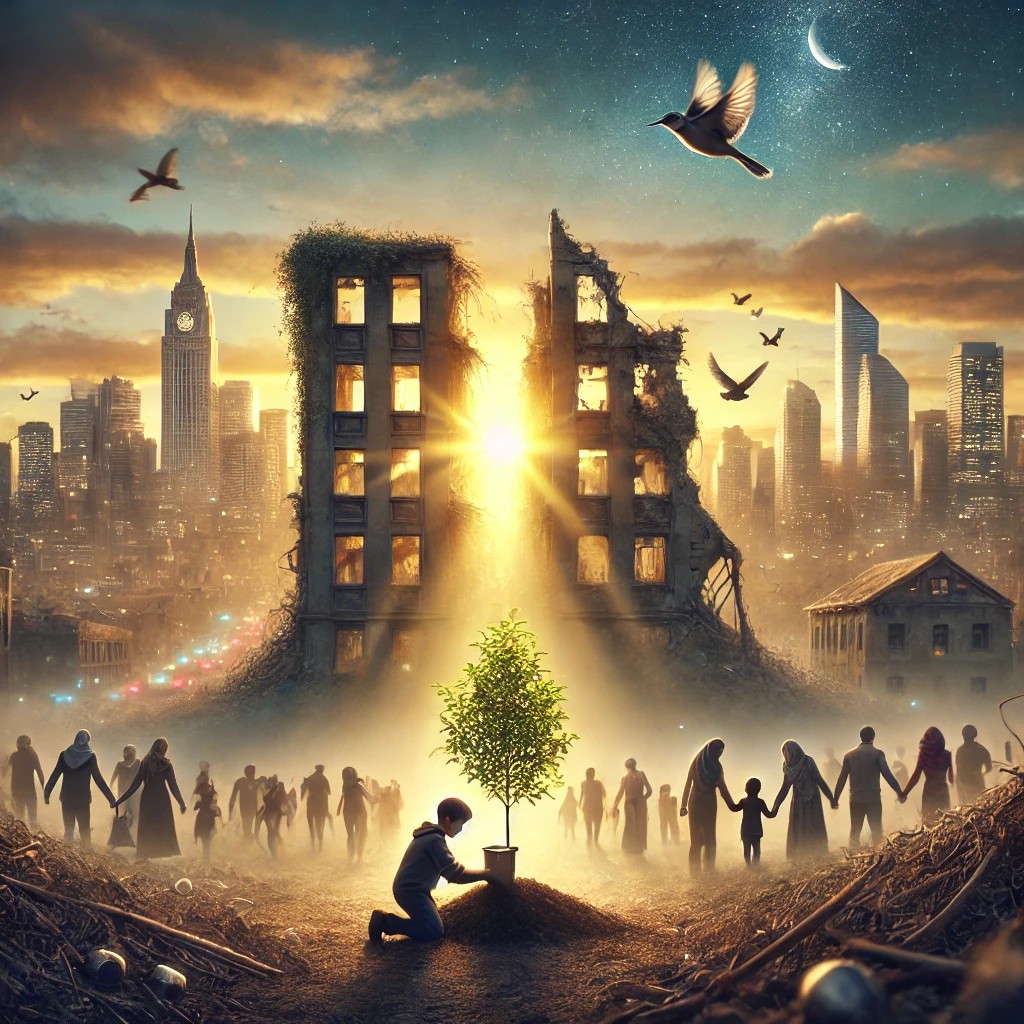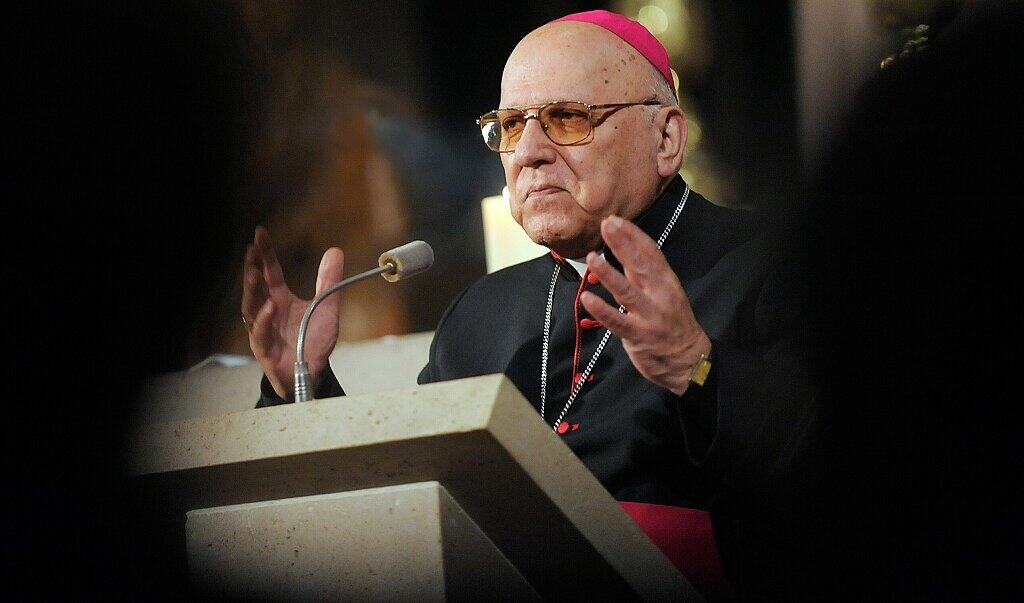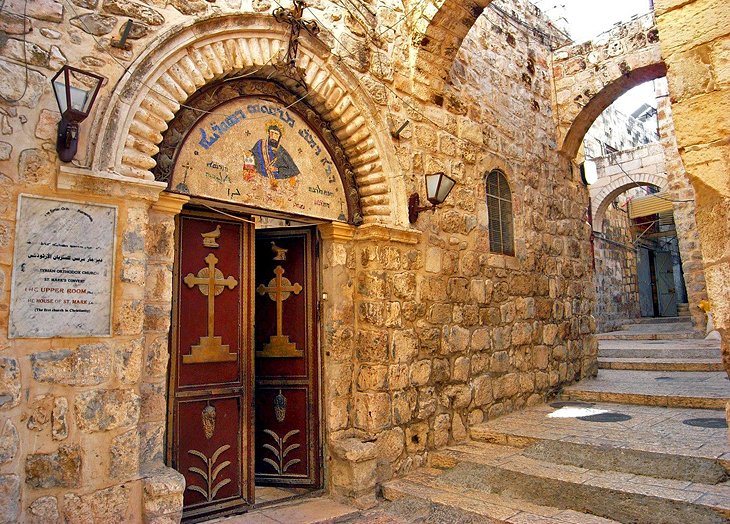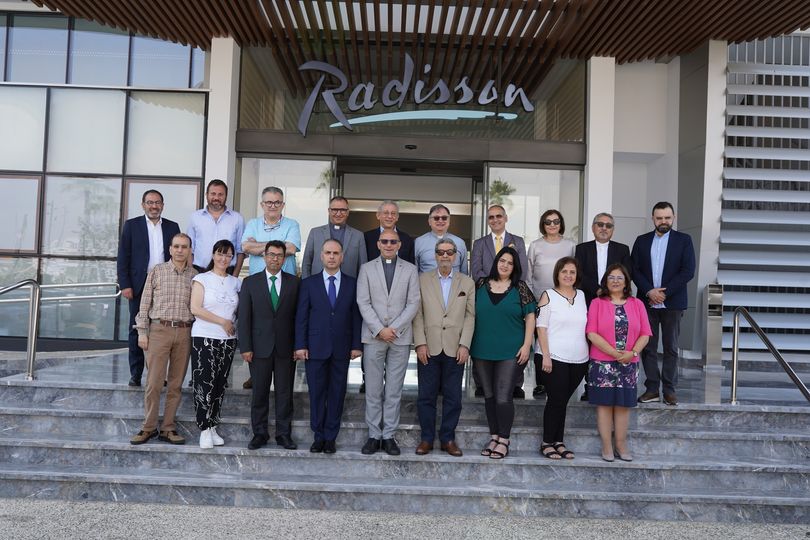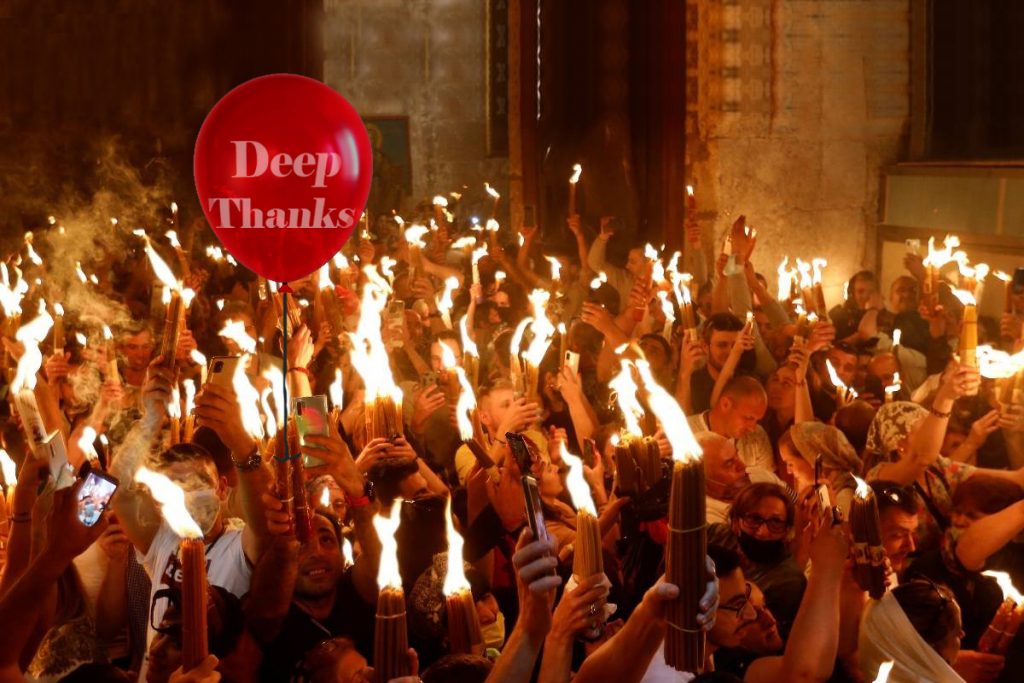Bloodshed follows bloodshed
A reflection on the latest round of violence in the Holy Land
Justice and Peace Commission (16.5.2022)
The Lord has an indictment against the inhabitants of the land.
There is no faithfulness or loyalty, and no knowledge of God in the land.
Swearing, lying, and murder, and stealing and adultery break out;
bloodshed follows bloodshed.
Therefore, the land mourns, and all who live in it languish
(Hosea 4:1-3)
اللغة العربية يتبع
French
Germen
The killing of Palestinian journalist Shireen Abu Akleh in Jenin on May 11, 2022 shocked us all. Gunned down, and she is not the last victim in the ongoing violence in the Holy Land. A daughter of our Christian community, she was well-known throughout the region as a news reporter for Al-Jazeera and thousands turned out to mourn her. The police brutality at her funeral has left us stunned. However, these past two months have seen much violence in the Holy Land most of it not reaching the headlines. Bloodshed has followed bloodshed, claiming the lives of Israeli Jews, Palestinian Arabs and others too, all victims of a conflict that grinds on, taking its grim toll. We mourn all the victims of this unending bloodshed, Jewish Israelis, Palestinian Arabs and others who have died. We continue to cry out that violence is wrong and will not bring a solution but only more violence.
At the same time, we also express our anxiety about what the future holds. The political authorities who decide the future in Israel-Palestine as well as the most important segments of the international community seem unwilling to reflect in truth and with courage about what is happening in the Holy Land. Consequently, they cannot act to root out the causes of this violence. In our attempt here to understand the root of this violence, we in no way seek to justify it, however understanding is the only way to begin to find a way out of this deadly cycle.
1. What has happened recently?
In the past two months, forty-five Palestinians, sixteen Israelis and two migrant workers have been killed in what has been termed “a new cycle violence”. And the violence continues… This violence, although predominantly taking place in Palestine, still under Israeli occupation, has manifested inside Israeli territory too, where fifteen Israelis who have died were killed in attacks carried out by Palestinians in retaliation for Israeli violence. Indeed, it is important to point out that this violence is part and parcel of the ongoing conflict.
2. Why are people dying?
As long as the conflict between Israeli Jews and Palestinian Arabs continues, as long as there is no justice, no equality and no peace in the Holy Land, no sincere engagement to end the conflict, death will continue to be victorious. As long as a regime of military occupation continues to be imposed on those who live in East Jerusalem, the West Bank and the Gaza Strip, and as long as a regime of discrimination continues to be administered within the State of Israel, there will be no end to the cycle of violence. As long as local political leaders advance their own personal interests and ignore the cries of the widows, the orphans, the mothers and fathers in mourning, all who live in this land languish, as the Prophet Hosea says. As long as the international community shirks its responsibility for the situation in Israel/Palestine, the cogwheels of this seemingly unending conflict will continue turning.
3. What are the causes of the violence?
When Palestinians attack Israeli Jews, many advance interpretations of their motivations. They attribute the violence to Palestinian, Arab or Islamic ideologies that reject Israel, Israelis and even Jews. However, these acts of violence must be analyzed first and foremost within the context of the ongoing Israel-Palestine conflict.
It needs to be repeated with unequivocal clarity: the root cause and primary context of the violence is the occupation of Palestine, an occupation that has gone on for fifty-five years.
The violence of the occupation includes land expropriation, administrative detention, the withholding of building permits, house demolitions, the restriction of movement, the stifling of political, social and economic development and the ongoing siege of the Gaza Strip.
In particular, the tensions in the holy city of Jerusalem continue to aggravate the situation and escalate the levels of tension. These tensions include the constant threats to the status quo in the Haram al-Sharif (also known as the Temple Mount), the stifling restrictions on access to the Holy Places (for Christians this was again underlined this past Orthodox Saturday of Light, Holy Saturday), and the ongoing attempts to claim properties in occupied East Jerusalem, resulting in the eviction of people from their homes to be given to settlers, particularly in Sheikh Jarrah and Silwan.
The massive and violent reprisals by the Israeli security forces against the family and sometimes against the whole neighborhood or town of alleged Palestinian perpetrators of violence creates new resentment, hatred and desire for revenge and provide fertile soil for new attacks against Israeli Jews. Many of the perpetrators have relatives and friends who have fallen victim to the violence inherent in the occupation. Similarly, certain attempts by the Israeli forces to “prevent” new attacks, in fact exacerbate the conditions that are leading to acts of violence as bloodshed follows bloodshed.
It is glaringly outrageous that much of the violence of which Palestinians are victims originates from Israeli settlers and their vigilante groups, who have expropriated Palestinian lands and live illegally in the territories occupied by Israel. In some parts of the West Bank, settlers dominate entire areas, imposing a reign of lawlessness and terror on Palestinian families, neighborhoods and villages, preventing the inhabitants from travelling freely, working their lands, pasturing their flocks and living ordinary lives. Rather than defining their acts as crimes, or even in some cases as terrorism, the settlers are too often aided and abetted by the Israeli military. This is particularly true in the city of Hebron and its southern environs and the city of Nablus and its environs.
Furthermore, although not unprecedented, the fact that Palestinian citizens of Israel are carrying out attacks on Israeli Jews underlines the alienation that many Palestinian Arab citizens of Israel feel in a state in which they are citizens but which is defined as a “Jewish” state. These attacks are a sign of despair in the face of ongoing discrimination against Arabs in Israel itself and the regime of inequality. Furthermore, these acts are also a cry of rage against those attempting to erase the Palestinian identity of the Palestinian Arab citizens of Israel.
Unfortunately, as long as Palestinians resort only to verbal protest or non-violent actions (when the Israeli authorities authorize this), the international community ignores the Palestinians and gives the impression that everything is normal, promoting “normalization” with the Israeli state despite the ongoing conflict. Sadly, only when violence erupts, the international community wakes up and takes note.
4. A wider context of injustice
The so-called “Abraham Accords” that were formulated and triumphantly promoted by the US Trump administration certainly add to the sense of frustration and despair at the heart of the latest rounds of violence. Israel has now signed so-called “peace” accords with countries with which Israel has no conflict. These accords pursue common regional interests like opposition to Iran and economic and military collaboration. However, the accords blatantly ignore the real conflict in Israel/Palestine and the rights of the Palestinians. For the Palestinians, this adds insult to injury, reinforcing their feeling that, in the eyes of Israel and the powerful in the international community, they do not exist. Real peace can only be made between Israel and Palestine.
Another piece in the contemporary puzzle in order to understand the latest round of bloodshed is connected to the situation in Eastern Europe. As soon as Russia invaded the Ukraine, the international community, led by the United States, condemned the invasion and far-reaching sanctions were imposed by many countries including the United States, the European Union and the United Kingdom in order to pressure the Russian regime to withdraw from Ukrainian territory and cease its aggression. Many Palestinians compare these recent events with the decades of conflict in their own homeland. Israel has occupied Palestinian territory since 1967 and has imposed a discriminatory regime of inequality on Palestinians within Israel since 1948. However, those most vocal in condemning Russian aggression have done little to denounce Israeli occupation and discrimination. This double standard has only sharpened Palestinian frustration and despair.
Conclusion: Seeking peace and pursuing it
Two and a half millennia ago, the prophet Ezekiel called out against the princes of the land, “Put away violence and oppression, and do what is just and right. Cease your evictions of my people” (Ezekiel 45:9).
Today we call on the authorities in Israel to seek out the reasons for the violence that engulfs us all. Responding to violence with violence, a logic of never-ending reprisal, is not the answer. Israel and Palestine have the same rights: the rights to security, freedom, dignity and self-determination. Violence will not end until these rights are realized for both Israelis and Palestinians equally.
Israel is on a quest for “peace” where peace cannot be found. Israel seeks peace with the regimes of Arab countries but not with the people of the region. Real peace will only be realized when the Palestinians can affirm that their rights have been implemented. Peace will begin when the Palestinians proclaim that they are no longer at war with Israelis. Only then will a new chapter begin in the region.
It is the Psalmist who reminds us: “Which of you desires life, and covets many days to enjoy good? Keep your tongue from evil, and your lips from speaking deceit. Depart from evil, and do good; seek peace, and pursue it. The eyes of the Lord are on the righteous, and his ears are open to their cry” (Psalm 34:12-15).
لجنة العدل والسلام
التابعة لمجلس رؤساء الكنائس الكاثوليكية في القدس
أفكار ورؤية في واقع العنف في الأرض المقدسة
١٦ أيار ٢٠٢٢
“فَإنَّ لِلرَّب ِّدَعوَى عَلَى سُكَّانِ الأرضِ، إذ لَيسَ فِي الأرضِ حَقٌّ
وَلا رَحمَةٌ وَلا مَعرِفَةٌ لله، بَل قَد فَاضَتْ اللعنَةُ وَالكَذِبُ وَالقَتلُ وَالسَّرِقَةُ وَالزِّنَى،
وَالدِّمَاءُ تُلَامِسُ الدِّمَاءَ،
لِذَلِكَ تَنُوحُ الأرضُ وَيَذبُلُ كُلُّ سِاكِنٍ فِيهَا” (هوشع ٤: ١-٣).
مقتل الصحفية شيرين أبو عاقة في جنين في ١١ أيار ٢٠٢٢ كان هزة للجميع. اغتيلت، وليست الضحية الأخيرة للعنف السائد في الأرض المقدسة. هي عضو في جماعتنا المسيحية، ولها شهرة واسعة في المنطقة، ومراسلة للجزيرة. توافد الألوف لتشييعها. وكان تدخل الشرطة الوحشي في جنازتها أمرًا أذهل الجميع. منذ أكثر من شهرين شهدنا عنفًا متزايدًا في الأرض المقدسة ولو أن بعضه لم يصل إلى مقدمة الأخبار. وزاد العنف وصارت “الدماء تلامس الدماء”، كما يقول النبي، وسقط ضحيته يهود إسرائيليون وفلسطينيون عرب وغيرهم، كلهم ضحايا صراع ما زال يطحن ويفترس ضحاياه. نبكي كل الضحايا في هذا العنف الذي لا ينتهي، يهودًا إسرائيليين، وفلسطينيين عربًا وغيرهم. وما زلنا نصرخ ونقول إن العنف خطأ ولن يأتي بأيّ حل، لن يأتي إلا بمزيد من العنف.
في الوقت نفسه، إنا نعبر عن قلقنا تجاه المستقبل. فإن السلطات الإسرائيلية التي بيدها قرار المستقبل في إسرائيل وفلسطين، وكذلك الكبار في الأسرة الدولية، يبدو أنهم لا يريدون أـن ينظروا نظرة حقيقية وشجاعة في ما يحدث في الأرض المقدسة. ولهذا فهم لا يقدرون أن يروا أسباب هذا العنف. نحاول في هذا التحليل أن نرى هذه الأسباب، لا للتبرير، لكن لأن فهم الأسباب ومعرفة الجذور هي الوسيلة الوحيدة التي تؤدي إلى إيقاف دائرة الموت هذه.
١ ما الذي حدث في هذه الأيام؟
قتل، في الشهرين الماضيين، خمسة وأربعون فلسطينيا، وستة عشر إسرائبليا، وعاملان من المهاجرين في إسرائيل كانا في الموقع، في ما سمي “بدائرة العنف الجديدة”. هذا العنف حدث بصورة رئيسة في فلسطين، الواقعة حتى الآن تحت الاحتلال الإسرائيلي، وظهر أيضًا في داخل إسرائيل، حيث قتل خمسة عشر إسرائيليا بهجمات نظمها الفلسطينيون ردًّا على العنف الإسرائيلي. من المهم الإشارة إلى أن هذه الهجمات داخل إسرائيل هي جزء لا يتجزأ من الصراع المستمر ولا يمكن فصلها عنه.
٢ لماذا يموت الناس؟
طالما استمر الصراع بين الإسرائيليين اليهود والفلسطينيين العرب، وطالما أنه لا يوجد عدل ولا مساواة ولا سلام في الأرض المقدسة، ولا التزام مخلص لإنهاء الصراع، سيبقى الموت هو المنتصر. وطالما استمر فرض نظام الاحتلال العسكري على الذين يعيشون في القدس الشرقية والضفة الغربية وقطاع غزة، وطالما استمر نظام التفرقة والتمييز داخل دولة إسرائيل، لن تكون هناك نهاية لدائرة العنف. وطالما أن القادة السياسيين المحليين يقدِّمون مصالحهم الشخصية ويتجاهلون صرخات الأرامل والأيتام والأمهات والآباء الباكين أحباءهم، فإن كل الذين يعيشون في هذه الأرض “سيَضعُفون ويَذبُلون”، كما يقول النبي. وطالما أن الأسرة الدولية تتنصَّل من مسؤوليتها تجاه الوضع في إسرائيل وفلسطين، ستستمر مجنزرات هذا الصراع في سحق الأحياء وإراقة الدماء إلى ما لا نهاية.
٣ ما هي أسباب العنف؟
في كل هجوم فلسطيني على اليهود الإسرائيليين، يحلِّل المحلِّلون ويقدِّمون تفسيراتهم وتبريراتهم. وينسبون العنف إلى أيديولوجيا فلسطينية عربية أو إسلامية، ترفض الاعتراف بإسرائيل، والإسرائيليين واليهود أيضًا. على أن أعمال العنف هذه يجب أن تحلل أولا وقبل كل شيء في إطار الصراع الإسرائيلي الفلسطيني.
لا بد من التأكيد والتكرار بوضوح لا لبس فيه: العلة الأساسية والأولى للعنف هي الاحتلال العسكري في المناطق الفلسطينية، وقد مضى عليه أكثر من خمس وخمسين سنة.
وعنف الاحتلال يعني مصادرة الأراضي، والاعتقال الإداري، ومنع تصاريح البناء، وهدم البيوت، وتقييد حرية الحركة، وخنق التنمية السياسية والاجتماعية والاقتصادية، والحصار المستمر على قطاع غزة.
وخاصة الوضع في القدس، المدينة المقدسة. فالتوترات فيها تؤدي إلى تصعيد مستويات التوتر في كل مكان، وأولها التهديدات المستمرة للوضع الراهن في الحرم الشريف (الذي يسميه الإسرائيليون باسم جبل الهيكل)، والقيود الخانقة المفروضة أمام الوصول إلى الأماكن المقدسة المسيحية (لا سيما في يوم سبت النور الأرثوذكسي، هذه السنة، في كنيسة القيامة)، والمحاولات المستمرة لمصادرة بيوت الناس وإخراجهم منها، وتسكين المستوطنين اليهود محلهم، خاصة في الشيخ جراح وسلوان.
علاوة على ذلك، فإن الأعمال الانتقامية الواسعة والعنيفة التي تقوم بها قوات الأمن الإسرائيلية ضد عائلة المقاومين، وأحيانًا ضد الحي أو البلدة بأكملها، لا تسبب إلا مزيدًا من الاستياءً والكراهية والرغبة في الانتقام، فهي أرض خصبة لهجمات جديدة ضد الإسرائيليين. مع العلم أن كثيرين من منفِّذي الهجومات لهم أقارب وأصدقاء سقطوا ضحايا للعنف الناجم عن الاحتلال الإسرائيلي. وكذلك، بعض الإجراءات التي تقوم بها القوات الإسرائيلية لـ “منع” اعتداءات جديدة، لا تؤدي في الواقع إلا إلى تفاقم الظروف، وإلى مزيد من العنف، وتصبح كلمة النبي صحيحة: “إراقة الدماء تلامس إراقة الدماء”.
وإنه لأمر مشين للغاية أن الكثير من أعمال العنف التي توقع الضحايا بين الفلسطينيين، سببها هم المستوطنون الإسرائيليون، الذين صادروا الأراضي الفلسطينية، ويعيشون بشكل غير قانوني في الأراضي التي تحتلها إسرائيل. في بعض أجزاء الضفة الغربية، يسيطر المستوطنون على مناطق بأكملها، ويفرضون وضعًا من اللاقانون، والإرهاب، على العائلات والأحياء والقرى الفلسطينية، فيمنعونهم من السفر بحرية ومن العمل في أراضيهم ومن رعي قطعانهم ومن أن يعيشوا حياتهم العادية. والجيش الإسرائيلي، بدلًا من ردعهم، وبدلًا من تعريف أعمالهم على أنها جرائم، وفي بعض الحالات هي إرهاب صارخ، يساعدهم ويحميهم في اعتداءاتهم. هذا صحيح بشكل خاص في مدينة الخليل والمناطق الواقعة جنوب المدينة، وفي منطقة نابلس، وغيرها.
علاوة على ذلك، الواقع ان مواطنين فلسطينيين في إسرائيل يقومون بهجمات على إسرائيليين يهود، وليس الأمر جديدًا، يعني عزل العديد من المواطنين العرب الفلسطينيين عن الدولة التي هم مواطنون فيها، إذ تُعرِّف نفسها بأنها دولة “يهودية”. هذه الهجمات هي صرخة يأس في وجه التمييز المستمر ضد العرب داخل إسرائيل، وفي وجه نظام عدم المساواة. وأعمال العنف هذه هي أيضا ردة فعل وصرخة غضب أمام الذين يحاولون مَحْوَ الهوية الفلسطينية للمواطنين العرب الفلسطينيين في إسرائيل.
وإنه لمن المؤسف جدًّا أنه حين يلجأ الفلسطينيون إلى الاحتجاج بالكلام فقط أو بالأعمال غير العنيفة (حين تسمح السلطات الإسرائيلية بذلك)، فإن المجتمع الدولي يتجاهل الفلسطينيين ويتصرف وكأن كل شيء طبيعي، ويعزز “التطبيع” على الرغم من استمرار الصراع. يبدو للأسف أن الأسرة الدولية تستيقظ فقط عندما تندلع أعمال العنف.
٤ مزيد من الظلم
الاتفاقات المسماة “باتفاقات إبراهيم” والتي روجت لها الإدارة الأميركية في عهد ترامب، زادت الشعور بالإحباط واليأس في قلب موجات العنف الأخيرة. وقَّعَت إسرائيل الآن على عدد من اتفاقات السلام مع بلدان ليست خصمًا لها. هذه الاتفاقات تسعي لتحقيق مصالح مشتركة في المنطقة، منها معارضة إيران، والتعاون الاقتصادي والعسكري. لكنها تتجاهل بوقاحة الصراع الحقيقي في إسرائيل وفلسطين وحقوق الفلسطينيين. هذه الاتفاقات في نظر الفلسطينيين، ما هي إلا زيادة الإهانة على الإهانة، وتراكم الظلم على الظلم، وتثبِّت شعورهم بأنهم، في نظر إسرائيل وكبار الأسرة الدولية، إنهم لا يوجدون. مع أن السلام الحقيقي لا يمكن أن يتم إلا بين إسرائيل وفلسطين.
قطعة أخرى من اللغز المعاصر لفهم الجولة الأخيرة من إراقة الدماء لها صلة بالوضع في أوروبا الشرقية. حالما بدأت روسيا غزوَ أوكرانيا، أدان المجتمع الدولي بقيادة الولايات المتحدة الغزو، فورًا، وفُرِضَت عقوبات واسعة وشديدة على روسيا من قبل العديد من الدول، بما في ذلك الولايات المتحدة والاتحاد الأوروبي والمملكة المتحدة، ذلك من أجل الضغط على النظام الروسي للانسحاب من الأراضي الأوكرانية والتوقف عن العدوان.
في الأراضي المقدسة، قارن فلسطينيون كثيرون هذه الأحداث في أوروبا الشرقية مع عقود من الصراع في وطنهم. فقد احتلت إسرائيل الأراضي الفلسطينية منذ عام ١٩٦٧ وفرضت نظام تمييز وعدم مساواة على الفلسطينيين داخل إسرائيل منذ سنة ١٩٤٨. ومع ذلك، فإن أولئك الذين شددوا في إدانة العدوان الروسي، لم يفعلوا شيئًا يُذكر للتنديد بالاحتلال وبالتمييز الإسرائيلي. ازدواجية المعايير هذه لا تؤدي إلا إلى زيادة الإحباط واليأس الفلسطيني.
الخاتمة: اسع إلى السلام واطلبه.
منذ ألفي سنة ونصف، تنبأ النبي حزقيال على رؤساء الأرض قال: ” كُفُّوا عَن العُنفِ وَالِاغتِصَابِ، وَأَجرُوا الحَقَّ وَالبِرّ، وَارفَعُوا عَن شَعبِي تَعَدِّيَاتِكُم، يَقُولُ السَّيِّدُ الرَّبّ” (حزقيال ٤٥: ٠).
نحن اليوم ندعو السلطات الإسرائيلية إلى النظر في أسباب العنف الحقيقية. طلنا ضحايا لهذا العنف. والرد على العنف بالعنف، ‘نما هو منطق انتقام لن يتوقف أبدًا، وليس الرد الصحيح. لكل من إسرائيل وفلسطين الحقوق نفسها: الحق على الأمن، والحرية، والكرامة، وتقرير المصير. ولن ينتهي العنف إلى أن تتحقق هذه الحقوق.
إسرائيل تبحث عن السلام حيث لا يوجد السلام. إسرائيل تبحث عن السلام مع الأنظمة الحاكمة في البلدان العربية، ليس السلام هناك. إنما السلام مع شعوب المنطقة وفي قلوب الناس. والسلام الحقيقي يبدأ عندما يعلن الفلسطينيون أنهم حصلوا على حقوقهم. يبدأ السلام عندما يقول الفلسطينيون إن حربهم مع إسرائيل انتهت. إذاك فقط يبدأ زمن جديد في هذه المنطقة.
يقول المزمور: “مَن ذَا الَّذِي يَهوَى الحَيَاةَ وَيُحِبُّ الأيَّامَ لِيَرَى فِيهَا الخَيرَاتِ؟ مِنَ الشَّرِّ صُنْ لِسَانَكَ، وَمِن كَلَامِ الغِشِّ
شَفَتَيْكَ. جَانِبْ الشَّرَّ وَاصنَعْ الخَيرَ، وَابتَغِ السَّلامَ وَاسعَ إلَيهِ. عَينَا الرَّبِّ عَلَى الأبرَارِ وَأُذُناَهُ إلَى صُرَاخِهِم” (مزمور ٣٤: ١٢-١٥).
Le sang versé succède au sang versé
Réflexions sur la dernière vague de violences en Terre Sainte
Commission Justice et Paix de Sabeel, le 16mai 2022
Le Seigneur est en procès avec les habitants du pays
Car il n’y a ni sincérité ni amour du prochain ni connaissance de Dieu dans le pays.
Imprécations, tromperies, assassinats, vols, adultères se multiplient ;
Le sang versé succède au sang versé.
Aussi le pays est-il désolé et tous ses habitants s’étiolent.
(Osée 4.1-3)
L’assassinat de la journaliste palestinienne Shireen Abu Akleh à Jénine le 11 mai 2022 nous a tous choqués. Tuée par une balle, elle n’est pas la dernière victime d’une violence qui se poursuit en Terre Sainte. Fille de notre communauté chrétienne, elle était très connue dans toute la région comme journaliste d’Al-Jazeera, et des milliers de gens sont venus la pleurer. La brutalité de la police à ses obsèques nous a laissés stupéfaits. Pourtant ces deux derniers mois nous ont fait vivre beaucoup de violences en Terre Sainte, et le plus souvent sans que cela fasse les gros titres des journaux. Le sang versé a succédé au sang versé, arrachant à la vie des juifs israéliens, des arabes palestiniens et d’autres aussi, tous victimes d’un conflit qui nous broie, sombre bilan. Nous pleurons toutes les victimes de ces effusions de sang ininterrompues, Israéliens juifs, Palestiniens arabes, et tous les autres morts. Nous continuons à crier que la violence est un mal et n’apportera pas de solution, mais seulement plus de violence encore.
En même temps, nous disons notre anxiété sur ce que l’avenir nous réservera. Les autorités politiques qui décident de l’avenir en Israël-Palestine, comme aussi les plus importantes composantes de la communauté internationale ne semblent pas vouloir se préoccuper en vérité et avec courage de ce qui est en train de se passer en Terre Sainte. Et à cause de cela elles ne peuvent pas non plus agir pour éliminer les causes de cette violence. Dans le présent essai pour comprendre les racines de cette violence, nous ne cherchons absolument pas à la justifier. C’est seulement en la comprenant que nous pourrons commencer à trouver une voie de sortie de ce cycle mortel.
1. Que s’est-il passé récemment ?
Au cours des deux derniers mois, quarante-cinq Palestiniens, seize Israéliens et deux travailleurs migrants ont été tués dans ce qu’il a été convenu d’appeler « un nouveau cycle de violence ». Et la violence se poursuit… Cette violence, bien que se déroulant surtout dans la Palestine encore sous occupation israélienne, s’est aussi manifestée à l’intérieur du territoire israélien où quinze Israéliens ont trouvé la mort, tués lors d’attaques menées par des Palestiniens qui ripostaient à la violence israélienne. Il est important de signaler que cette violence fait partie intégrante du conflit en cours.
2. Pourquoi les gens meurent-ils ?
Aussi longtemps que le conflit entre juifs israéliens et arabes palestiniens se poursuivra, aussi longtemps qu’il n’y aura ni justice, ni égalité, ni paix en Terre Sainte et pas d’engagement sincère pour mettre fin au conflit, la mort continuera à être victorieuse. Aussi longtemps qu’un régime d’occupation militaire continuera à être imposé aux habitants de Jérusalem-Est, de la Cisjordanie et de la Bande de Gaza, et qu’un régime discriminatoire continuera à être appliqué à l’intérieur même de l’État d’Israël, le cycle de violence ne connaîtra pas de fin. Aussi longtemps aussi que des leaders politiques locaux privilégieront leurs intérêts personnels en ignorant les cris des veuves, des orphelins, des mères et des pères endeuillés, tous ceux qui vivent dans ce territoire vont s’étioler, comme dit le prophète Osée. Tant que la communauté internationale fuira ses responsabilités envers ce qui se passe en Israël-Palestine, on ne sortira pas de l’engrenage de cet apparemment interminable conflit.
3. Quelles sont les causes de cette violence ?
Lorsque des Palestiniens s’attaquent à des Juifs israéliens, beaucoup proposent des interprétations de ce qui les motive. Ils attribuent la violence à des idéologies palestiniennes, ou arabes ou islamiques qui rejettent Israël, les Israéliens et même les Juifs. Mais il faut commencer par analyser ces actes de violence et avant tout les replacer dans le contexte du conflit Israël-Palestine qui perdure.
On doit le redire clairement et sans équivoque : la cause fondamentale et le contexte principal de la violence est l’occupation de la Palestine, une occupation qui dure depuis cinquante-cinq ans.
La violence de l’occupation inclut l’expropriation des terres, la détention administrative, le refus d’accorder des permis de construire, les démolitions de maisons, les restrictions imposées aux déplacements, l’étouffement du développement politique, social et économique, et la poursuite du siège de la Bande de Gaza.
En particulier les tensions dans la ville Sainte de Jérusalem continuent d’aggraver la situation et de faire monter le niveau des tensions. Parmi les raisons de ces tensions, il faut citer les menaces permanentes sur le statu quo du Haram al-Sharif (connu aussi comme Mont du Temple), les restrictions étouffantes du droit d’accès aux lieux Saints (pour les chrétiens cela a encore été le cas ce dernier samedi Saint du calendrier orthodoxe, pour la cérémonie du Feu Sacré), et les revendications constantes de propriétés à Jérusalem-Est occupée menant aux évictions répétées de gens hors de leurs foyers pour donner ceux-ci à des colons juifs, tout particulièrement dans les quartiers de Sheikh Jarrah et de Silwan.
Les représailles massives et violentes des forces israéliennes de sécurité contre la famille et parfois contre tout le voisinage voire toute la ville de Palestiniens accusés d’être les auteurs d’actes de violences créent de nouveaux ressentiments, de la haine et un désir de revanche, et produisent le terreau pour de nouvelles attaques contre des Juifs israéliens. Beaucoup de ceux qui s’y livrent ont des parents ou des amis qui ont été victimes de la violence inhérente à l’occupation. De même certaines tentatives des forces israéliennes de vouloir « prévenir » de possibles nouvelles attaques ne font qu’augmenter les conditions pouvant mener à des actes de violence, de sorte que « le sang versé succède au sang versé ».
Il est absolument scandaleux que beaucoup de la violence dont sont victimes des Palestiniens provienne de colons israéliens et de leurs groupes d’autodéfense qui ont exproprié des terres palestiniennes et qui vivent tout à fait illégalement dans des territoires occupés par Israël. Dans certaines parties de la Cisjordanie, les colons contrôlent des zones entières et imposent un régime d’illégalité et de terreur aux familles palestiniennes, à leurs quartiers et à leurs villages, empêchant les habitants de se déplacer librement, de travailler leurs terres, de faire paître leurs troupeaux et tout simplement de mener une vie normale. Au lieu que leurs actes soient qualifiés de crimes ou même, dans certains cas, de terrorisme, les colons ne sont que trop souvent aidés ou même encouragés par l’armée israélienne C’est tout particulièrement le cas à Hébron et dans la zone située au sud de la ville, et aussi à Naplouse et ses environs.
En outre et bien que ce ne soit pas la première fois, le fait que des citoyens palestiniens d’Israël se livrent à des attaques contre des Juifs souligne la profonde aliénation que ressentent de nombreux Palestiniens qui vivent en Israël, dans un État dont ils sont des citoyens mais qui se définit comme un État « Juif ». Ces attaques sont un signe de désespoir face à la discrimination continue envers les Arabes en Israël-même et envers le régime d’inégalité qui leur est imposé. Ces actes sont aussi un cri de rage contre ceux qui tentent de faire disparaître l’identité palestinienne des citoyens arabes palestiniens d’Israël.
Malheureusement, aussi longtemps que les Palestiniens n’ont recours qu’à des protestations verbales ou à des actions non-violentes (quand les autorités israéliennes les autorisent à y recourir), la communauté internationale ignore les Palestiniens et donne l’impression que tout est normal, en faisant la promotion de la « normalisation » des relations avec l’État d’Israël malgré le conflit en cours. Il est triste de constater que c’est seulement quand la violence éclate que la communauté internationale se réveille et prend acte.
4. Un contexte d’injustice plus étendu
Les soi-disant « Accords d’Abraham » qui ont été formulés et triomphalement promus par l’administration Trump aux États-Unis ont certainement encore accru le sentiment de frustration et de désespoir qui est au cœur des derniers rounds de violence. Israël a maintenant signé un soi-disant accord de « paix » avec des pays avec lesquels Israël n’avait aucun conflit. Ces accords concernent des intérêts régionaux communs comme l’opposition à l’Iran et une collaboration économique et militaire. Mais ces accords ignorent entièrement le conflit réel en Israël-Palestine et les droits des Palestiniens. Pour les Palestiniens c’est ajouter l’insulte à la blessure et renforcer leur sentiment qu’aux yeux d’Israël et des puissants de la communauté internationale ils n’existent pas. Une paix réelle ne peut se faire qu’entre Israël et la Palestine.
Un autre élément du puzzle contemporain qu’il est important de prendre en compte pour comprendre le dernier round de sang versé est lié à ce qui se passe en Europe de l’Est. Dès que la Russie a envahi l’Ukraine, la communauté internationale, emmenée par les États-Unis, a condamné cette invasion, et des sanctions importantes ont été imposées par de nombreux pays dont les États-Unis, l’Union Européenne et le Royaume Uni afin de faire pression sur le régime russe pour qu’il se retire du territoire ukrainien et mette fin à son agression. Beaucoup de Palestiniens comparent ces récents évènements aux décennies de conflit qu’ils vivent dans leur propre patrie. Israël occupe le Territoire palestinien depuis 1967 et impose un régime discriminatoire d’inégalité aux Palestiniens citoyens d’Israël depuis 1948. Mais ceux qui élèvent le plus la voix pour condamner l’agression russe n’ont pas fait grand-chose pour dénoncer l’occupation et la discrimination israéliennes. Cette attitude de deux poids deux mesures n’a fait qu’aggraver la frustration et le désespoir des Palestiniens.
Conclusion : Rechercher la paix et ne pas arrêter de la poursuivre
Il y a deux millénaires et demi, le prophète Ezéchiel a élevé la voix contre les princes de son pays : « Rejetez la violence et la rapine, pratiquez le droit et la justice. Cessez vos exactions contre mon peuple » (Ézéchiel 45.9). Aujourd’hui nous demandons aux autorités d’Israël de chercher les raisons de la violence qui nous submerge tous. Répondre à la violence par la violence dans une logique de riposte sans fin n’est pas la réponse. Israël et la Palestine ont les mêmes droits : les droits à la sécurité, à la liberté, à la dignité et à l’autodétermination. La violence ne cessera pas tant que ces droits ne seront pas réalisés pour les Israéliens comme pour les Palestiniens, à égalité.
Israël est en quête de « paix » là où on ne peut pas trouver la paix. Israël recherche la paix avec les régimes de pays arabes mais pas avec le peuple de la région. La paix réelle ne sera réalisée que lorsque les Palestiniens pourront affirmer que leurs droits ont été mis en œuvre. La paix commencera lorsque les Palestiniens proclameront qu’ils ne sont plus en guerre avec les Israéliens. C’est alors seulement qu’un nouveau chapitre s’ouvrira dans la région.
C’est le psalmiste qui nous le rappelle : « Quelqu’un aime-t-il la vie ? Veut-on voir des jours heureux ? Garde ta langue du mal et tes lèvres des médisances. Évite le mal, agis bien, recherche la paix et poursuis-la ! Le Seigneur a les yeux sur les justes et l’oreille attentive à leurs cris » (Psaume 34.13-16).


